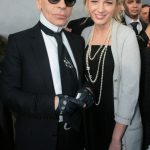On W’s Five Things with Lynn Hirschberg podcast, Hollywood’s brightest sit down with the magazine’s Editor-at-Large to talk about “Five Things” that have made them who they are: a person, a place, an object, one positive event, and one negative event that ultimately turned into something positive.
For the series’ third season, Hirschberg caught up with Brit Marling to discuss the filmmaker and actor’s work on Murder at the End of the World, the FX show that she co-wrote and co-produced with her creative partner, Zal Batmanglij, which stars Emma Corrin and premieres November 14.
Marling, a Midwest native, originally got her start in documentary filmmaking, but a chance encounter with the late actor and acting coach Harry Mastrogeorge inspired her to venture into theatrical performance. She starred in several films that had successful Sundance premieres, each of which she co-wrote, including Sound of My Voice, Another Earth, and The East. But it was 2016’s The OA, a twisty, supernatural mystery series on Netflix that Marling co-created, wrote, and starred in that would become her true breakthrough. Despite being canceled after just two seasons, it has become a cult favorite with a devoted fanbase.
Listen to the full episode below:
Now, with Murder at the End of the World, Marling once again brings viewers into a fantasy world where all is not as it seems (in addition to writing, Marling also directed episodes of the show and stars as the wife of an enigmatic billionaire). In the podcast, Marling tells Hirschberg about how Mastrogeorge changed her life, giving her the gift of freedom in her art, and a rigorous practice through which to develop her imagination.
She also speaks of her love of artist Francesca Woodman’s nude self-portraits. “(Her photographs are) a reminder of what I’m always trying to do in the work, which is figure out a way to return to something more primal before all the other ideas or indoctrinations slip in about what a woman is supposed to be, or how a female character is supposed to behave, or occupy space,” Marling tells Hirschberg.
She also shares the words of wisdom she received from one of Hollywood’s most legendary leading men. One year at Sundance, Robert Redford pulled her aside and, “He was like, ‘Brit, you seem like a sensitive person, and I want to give you a piece of advice that you might not understand now but might unpack over the years,’” Marling says. “He’s like, ‘Whatever you do, do not let them treat you as an object, because if you let them treat you as an object, eventually you will find that you are unconsciously starting to act as an object. And once you start to unconsciously act as an object, that’s a very short step away from literally becoming an object and losing your soul.’”
She held onto her true character, though, and at the end of the episode tells Hirschberg about a challenging time in her life, when she left her home, was diagnosed with a difficult illness, and The OA was canceled all at the same time.
“We had planned The OA to be a sort of five-part endeavor, and after two we ended up being canceled,” she explains. “I still sometimes when I’m traveling around, I’m in the strangest places and people will do the move—the series of movements that people do in the story to open another dimension. I’ll be in like a small town in Texas and somebody at a coffee shop will start doing the movements at me and I’m just like, ‘Wow.’ That was the power of Netflix at that time. You could make something quite subversive and literally millions of people all over the world would see it in a single day. And so I think it was hard, because its cancellation was trending worldwide on Twitter. And so you’re like, ‘Well, wait, how can something that’s trending worldwide on Twitter be canceled?’ But here we are. Netflix changed a lot, and it was a different place, and we had to let go of that story.”
To subscribe to Five Things, visit Spotify, Apple Podcasts, or wherever you get your podcasts.



